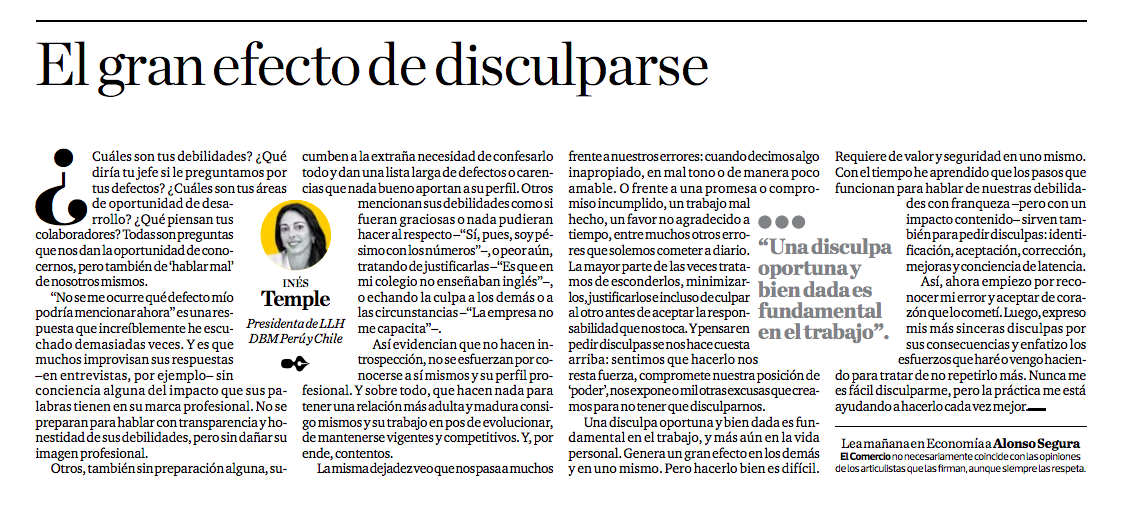Original Spanish version published in El Comercio newspaper (Peru) on October 1, 2016
What are your weaknesses? What would your boss say if we asked him or her about your faults? What are your areas of opportunity for development? What do your colleagues think about this subject? All of these questions give us an opportunity to know ourselves, but also to put ourselves down.
“I can’t think of any of my shortcomings right now,” is an answer that, though hard to believe, I have heard too many times. This is because many people improvise their answers –in interviews, for example– without any idea of the impact that their words have on their professional brand. They do not prepare to speak transparently and honestly about their weaknesses, while not damaging their professional image.
Others, also without any preparation whatsoever, yield to that strange need to “confess” everything and offer a long list of flaws, weaknesses, or deficiencies that contribute nothing to their profile. Others refer to their weaknesses as if they were funny or something they could not help: “what can I say, I am terrible with numbers”. Even worse, they try to justify them (“the problem is that they didn’t teach English at my school”) or blame other people or circumstances (“the company doesn’t train me”).
By this, they show they do no self-examination and make no effort to know themselves, their weaknesses, and their professional profile. Above all, they show that they do nothing to have a more adult and mature relationship with themselves and their work in order to evolve, grow, and remain relevant and competitive, and therefore, happy.
I often see that many of us have the same slack attitude towards our mistakes: when we say something inappropriate, rude, or unkind and offend someone. The same is true when we fail to keep a promise or fulfill a commitment, we do a bad job, or we do not thank a favor soon enough, among many other mistakes we make on a daily basis. Most of the time we try to hide them or deny them, minimize them, justify them, or even blame someone else before fully accepting our responsibility and the consequences of our mistakes. And the thought of apologizing is annoying: we feel that it makes us weaker, jeopardizes our position of “power”, exposes us, makes us vulnerable, or a thousand other excuses we make in order not to apologize.
A timely and genuine apology is essential at work and even more so in our personal and family life. It has a major effect on others and oneself. But apologizing well is hard and requires courage and self-confidence. With time, I learned that the same steps that work for speaking about our weaknesses or flaws frankly and honestly –but with a contained impact– also work for making sincere apologies: identification, acceptance, correction, improvements made, and awareness of latency.
So, I start by acknowledging my mistake and genuinely accepting that I made a mistake. Then I express my most sincere apologies for any consequences and emphasize the efforts I will make or am making to try not to repeat the mistake. It is never easy for me to apologize, but practice is helping me to do it better each time…

The new normal is complex and challenging. Our best positive attitude will be decisive for us to ...
Good leaders seek and create network with other leaders. They know they are responsible for devel...
ncertainty, urgency, or crisis does not give anyone an excuse to be abusive, or act without respe...
Care for yourself by ensuring that you keep stress and workloads at manageable levels. Pass on go...
Original Spanish version published in El Comercio newspaper on April 26, 2020 Whe...
Published in www.ypo.org on September 11, 2020 I am still fascinated by the results of ...
The concerns, motivations, or problems of each team member, as well as the challenges and obstacl...
You are the head of the corporation that is you. Take 30 minutes each quarter to review how much ...
The key is to reframe your attitude so that you don’t fall behind. Recognize your advantages and ...
I continue to work in this and we are making headway, but more respect, empathy, and, sometimes, ...
It’s important to identify our level of employability, recognize its advantages and limitations, ...
Originally published in ceoworld.biz on May 21, 2019 The world of work has changed dramatically, ...
To improve employability, we need to persistently sharpen our work skills and social intelligence...
The challenge is to thoroughly understand our personal reactions to change and immediately focus ...
And yes, we deserve to give ourselves the opportunity to find a job that awakens our enthusiasm a...
Some time ago, I made a mistake, which like all of the mistakes we make, was completely involunta...
Remember that productivity and employability are intrinsically linked –the higher the level of em...
Of course, this is a huge challenge to personal discipline, but we have to appeal to professional...
I want a leader who inspires my respect and admiration for his/her serious, legitimate, and authe...
Original Spanish version published in America Economia (Peru) on September 22, 2016 Ma...
Original Spanish version published in El Comercio newspaper (Peru) on June 11, 2016 “I don’t like...
If you were patient enough to answer these questions and if you made the effort to write the answ...
Original Spanish version published in Aptitus magazine, on May 9, 2018 It is common to see c...
¿Cuántos de nosotros nos sentimos realmente hábiles en las redes? ¿Quién tiene tiempo de calidad ...
What a pleasure it is to help groups of Peruvians to allow themselves to dream and imagine a bett...
When traveling, you remember and compare the experience you had at each hotel where you stayed. ...
The way we answer and the quality of the ideas we express will differentiate us from the others w...
Original Spanish version published in America Economia (Latin America) on March 27, 2018 We ...
Original Spanish version published in El Comercio newspaper (Peru) on March 18, 2018 Twenty-...
Original Spanish version published in El Comercio newspaper (Peru), March 4, 2018 Regardless of t...
Original Spanish version published in El Comercio newspaper (Peru) on February 17, 2018 There are...
Original Spanish version published in El Comercio newspaper (Peru) on January 20, 2018 Hacking, i...
Translation of the original article published December 21, 2017 on América Economía (Latam) Some ...
Original Spanish version published in America Economia (Latin America) on October 23, ...
Original Spanish version published in El Comercio newspaper (Peru) on September 30, 2017 Man...
Original Spanish version published in America Economia (Latin America) on September 2, 2017 There...
Original Spanish version published in El Comercio newspaper (Peru) on July 22, 2017 And when I [&...
Translation of the original article published June 24, 2017 on El Comercio (Perú) Given all the n...
Original Spanish version published in El Comercio newspaper (Peru) on January 4, 2017 We all...
Original Spanish version published in El Comercio newspaper (Peru) on March 4, 2017 As a young [&...
Original Spanish version published in the El Comercio newspaper (Peru) on February 4, 2...
1.Good leaders lead (excuse the redundancy) for the greater good, not to build up their egos, [&h...
Some time ago I wrote about this same subject and was very pleased with the comments […]
Translation of the original article published July 23, 2016 on El Comercio (Perú). Tired of so m...
Original Spanish version published in El Comercio newspaper (Peru) on May 20, 2015 Who wants...
Original Spanish version published in El Comercio newspaper (Peru) on January 1, 2017 Advers...
Being perceived as young or old is now associated more with a series of behaviors and attitudes t...
It’s important to note that our facial expressions, gestures, and posture also send those valuabl...
Original Spanish version published in El Comercio newspaper (Peru) in November 21, 2016 I h...
Original Spanish version published in America Economia (Latin America) on October 28, 2016 As har...


